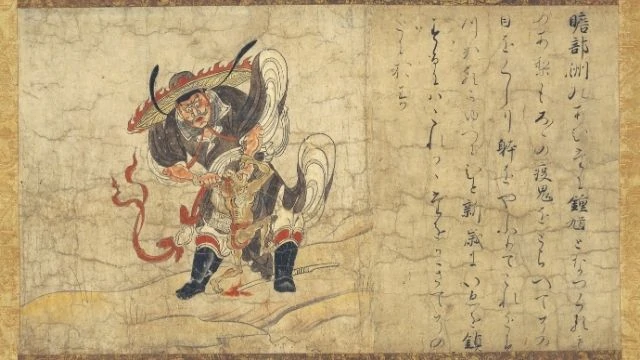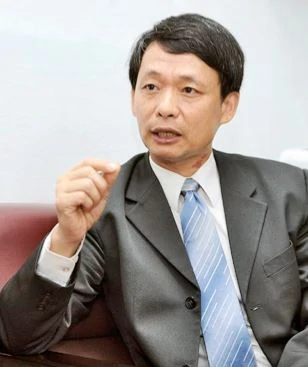In 1997, a prosecutor accused a respected Taiwanese spiritual master of practicing black magic. Although ridiculous, the accusation was part of a historical and old tradition of discrimination.
by Massimo Introvigne
Zhong Kui, a Chinese folk hero-god believed to be able to command 80,000 ghosts (credits).
On April 16, 1997, a prosecutor in a democratic country, and one already well-known at that time for its companies producing cutting-edge electronic products, disclosed the indictment against a spiritual leader and his followers, whom he was investigating from the previous December. The document accused them of “raising goblins.”
In Chinese and other Asian folklore, magicians raise “goblins,” i.e., spirits or demons, to seek their help for (normally malevolent) enterprises. Prosecutor Hou Kuan-jen, of the Taipei District Prosecutors Office, raised this accusation against Dr Hong Tao-Tze, the leader (Zhang-men-ren) of Tai Ji Men, a Taiwan-based menpai (similar to a “school”) of Qigong and martial arts, and his co-defendants. Hou had started in 1996 a personal crusade against Tai Ji Men. Eventually, it failed. Hong and his dizi (disciples) were found innocent of all charges. National compensation for the wrongful detention was given to Hong and his co-defendants.
The accusation of raising goblins was announced by Hou in television, and met with both skepticism and ridicule. “Raising goblins” is not part of Taiwanese spirituality, mostly occurs in movies and novels there, and is certainly foreign to Tai Ji Men culture and worldview.
Hou understood that he was at risk of becoming a national and perhaps even international laughingstock, as the impression was that he, the prosecutor, was the one who believed in goblins. In a belated attempt to contain a damage of its own making, on April 17, the following day after the indictment was published, he dispatched investigators with empty fruit cartons to search Tai Ji Men academies in Taan, Nankang, Shulin, and Kaohsiung.
Meanwhile, Hong remained unaware of the whole goblin business. Only in the afternoon of April 17 he was asked by Hou whether he had raised goblins. Obviously, he denied it. Prosecuting the case first, then searching for evidence, and finally interrogating the defendants are practices completely contrary to due process of law.
Prosecutor Hou and the investigators did not find any goblin in the Tai Ji Men academies, but they were afraid of being embarrassed in front of the media. So, the prosecutor seized a peach wood sword, which in Chinese folklore is sometimes used to dispel evil and invoke good luck.
A senior journalist, Fan Li-da, called the Taipei Field Office of the Bureau of Investigation about the matter, and recorded the conversation. An investigator told Fan: “Li-da, frankly speaking, the law requires investigators to follow the guidance of prosecutors. Therefore, when a prosecutor asks investigators to perform a legal action, we investigators cannot refuse. However, if prosecutors wish to catch a ghost, they should go to a priest or monk rather than investigators. Otherwise, we would not properly perform our duties. Also, I doubt the seizure of a peach wood sword can prove [Dr.] Hong knows any black magic.” However, the investigator said, “according to Prosecutor Hou, he would hand over this peach wood sword to the court as a piece of evidence that supports [Dr.] Hong raising goblins.”

Prosecutor Hou (from Facebook)
Eventually, this did not happen. Hou used the peach wood sword with journalists, to support his ridiculous claims. But he never produced it in court. When the case ended, and the defense attorneys tried to recover the evidence, the clerks could not find the sword, no matter how hard they tried. The alleged smoking gun had vanished, just as the prosecutor’s case.
This was indeed a pity because the sword was a commemorative artwork. There was nothing mysterious about it. It was created by a local artist and given to Hong by a dizi, Mrs. Cheng Tsui-Yu, as a gift. Cheng was the grandmother of Liu Tao-yuan. More than twenty years after the case, he is still angry about the incident, and reports that also “the artist who created the peach wood sword was very upset when he learned that it was alleged by the prosecutor as a tool for raising goblins.”
Finally, Hou admitted in a TV program called News 100 on the TVBS network, on May 5, 1997, that he did not have evidence of Hong raising goblins, but relied on what he called his is “intuition as a seasoned prosecutor.” Again, Hou’s “intuition” appeared as not based on normal human logic.
Yet, one question remains. Why on earth did Prosecutor Hou introduce the goblins in his case? One theory, hinted at by American legal scholar Ken Jacobsen, who has studied the Tai Ji Men file, is that Hou was simply so much obsessed with the case that he did not realize he was courting ridicule.
There is, however, another possibility. Both in Taiwan, during the Martial Law period and when the government decided to crack down on several groups in 1996, and in Mainland China, religious and spiritual movements the authorities do not approve of are labeled xie jiao. The expression is often translated in English as “cults,” or “evil cults,” but the translation is not precise and somewhat anachronistic.
Wu Junqing, a research fellow at London University, has published several studies on the history of the notion of xie jiao, including the book Mandarins and Heretics (Leiden: Brill, 2017). While other scholars date the introduction of xie jiao as a political and legal category to the Ming era, Wu shows that it first appeared, with the meaning of “heterodox teachings,” in the writings of Fu Yi (554–639), who called for the eradication of Buddhism during the Tang dynasty. In the subsequent Song (960–1279) and Yuan (1279–1368) dynasties, xie jiao was used to call for the destruction of new religious movements banned under the common label of “White Lotus.” With the Ming dynasty (1368–1644), xie jiao became a legal concept, and lists of xie jiao started being compiled, a practice continued by the Qing dynasty (1644–1912), Republican, and Communist China, and which also influenced Taiwan.
Wu demonstrated that intellectuals were mobilized to argue that xie jiao were “heterodox” in a religious sense, i.e., not a part of established, traditional, or acceptable religion, but in fact it was the authorities that first designated a group as xie jiao, based on their perception that it was hostile to, or not supportive enough of, the government.
Wu explains that official propaganda invariably raised two accusations against the groups designated as xie jiao, that they conspired against the government and that they practiced black magic. Whether or not these accusations were true was not important. For instance, at one stage Roman Catholicism was designated as a xie jiao, and Catholic priests were accused of “practicing black magic,” even if Catholicism in fact categorically refuses and condemns magic.
When Prosecutor Hou designated Tai Ji Men as a xie jiao, the movement was not only accused of not supporting the winning party in the 1996 elections—the very reason several spiritual groups were persecuted in that year (although in fact Tai Ji Men had not taken political sides). By accusing Hong and Tai Ji Men of “raising goblins,” Hou was using a century-old rhetoric, which implied that “black magic” was something typical of all spiritual groups the government perceived as, or declared, hostile. Similar accusations were raised against other groups, and this still happens today in Mainland China.
As Wu argues, with these accusations politicians and prosecutors subtly imply that they offer to the populace their own “white magic,” capable of solving all problems, opposed to the “black magic” of the “bad” groups. Today, they use media manipulation to justify their human rights violations and create a fake image of safeguarding justice.
Taiwan in 1997 was not China in the Ming era, nor was it Mainland China today, where there is no free press able to criticize the prosecutors. The “black magic” and “raising goblins” accusations failed miserably, and put at risk the international image of Taiwan’s legal system.
Hou realized that his charges of fraud against Hong created through his superior “intuition” and invention—the goblin story—will be thrown out of court. He switched to tax evasion and enlisted the help of the National Tax Bureau. This is a different story, and one we have told elsewhere.
On the one hand, Prosecutor Hou applied a century-old Chinese tradition of persecuting spiritual minorities on Tai Ji Men, while on the other hand, by including bizarre arguments in his case, he cast a doubt on all his accusations and claims, including those about taxes.
Source : Bitter Winter
